© 2026 ALLCITY Network Inc.
All rights reserved.

Welcome to my weekly Chicago Bears Redzone Report where I take a deep dive into every red zone possession on both sides of the ball.
A team’s success or failure inside the red zone has a strong correlation to its overall performance. In many ways, it’s do or die inside the 20.
I want to take some time every week to analyze these critical possessions.
This week, there were five total red zone trips. Two from the Bears’ offense and three on defense.
Let’s see how they fared …
Bears offense
Trip 1 (Score: 7-10)
Quarter: 3 | Time Remaining: 12:45
How They Got There: After scoring a 51-yard touchdown on their previous possession, the Bears mounted a drive that started all the way back at its own 16. Thanks to a couple of critical penalties by the 49ers that extended the drive twice, the Bears found themselves knocking on the door of the red zone.
But it was when Justin Fields found Darnell Mooney for an 8-yard reception on second down that the Bears finally got inside the 20 for the first time of the year, where they faced a pivotal third-and-2 from the 49ers 18.
The Result: Fields found Equanimeous St. Brown on a play-action pass in the end zone for the touchdown … and the lead.
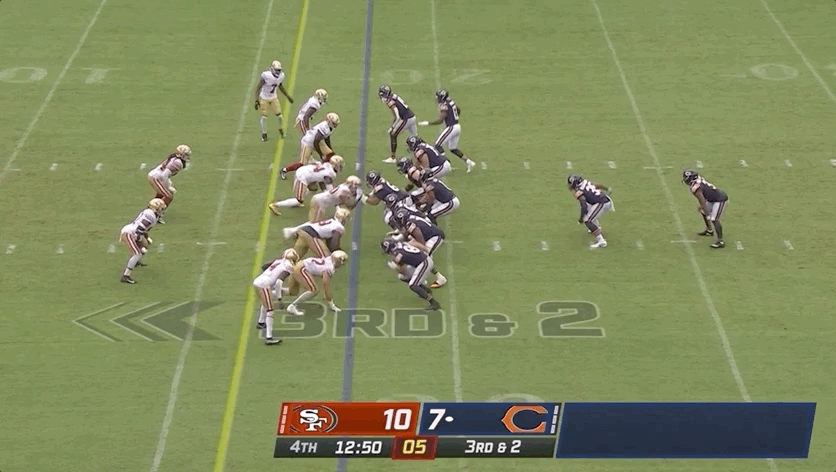
Analysis: Just like the defense (see below), the Bears’ offense achieved the best-case scenario on the very first play in the red zone.
The Bears ran a very similar play earlier in the game, where they ended up keeping it on the ground. Kudos for the entire offense, especially St. Brown, for selling the run. The 49ers defense bought the play fake, got sucked up, and St. Brown was able to leak behind them to get wide open in the end zone.
This was a great play call by Luke Getsy on third-and-short that took advantage of the 49ers’ aggressiveness.
And perhaps the most underrated element of this play?
Chicago had Mooney, its best receiver, on the sidelines — only giving the 49ers further reason to fully believe the play was going to be a run.
Trip 2 (Score: 13-10)
Quarter: 4 | Time Remaining: 9:03
How They Got There: Eddie Jackson’s interception set the Bears on the cusp of the red zone as Chicago started the drive at the 49ers’ 21. Khalil Herbert ran in all the way down to the 11 on the very first play of the drive, which got Chicago into the red zone for the second time.
The Result: Herbert punched it in for the touchdown from three yards out, making it a two-score game with less than eight minutes remaining.
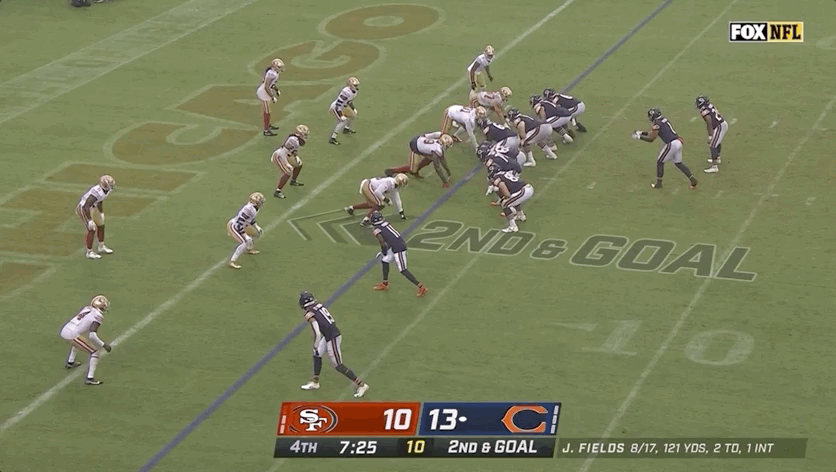
Analysis: With the rain starting to pick up, the great starting field position and a lead to protect, it made sense for the Bears to keep it on the ground and chew some clock.
The first play was a designed quarterback run to the left. It wasn’t blocked well and Fields ended up sliding for a one-yard loss. This was a wise decision by the quarterback to avoid contact and remain in bounds to keep the clock running.
Herbert gained five yards on the following play, taking the ball inside the 10, but a defensive holding call on Javon Kinlaw set the Bears up with a golden opportunity — first-and-goal from the 3 yard line.
After getting bottled up on first down, Herbert took the handoff from shotgun. The second-year back was originally looking to run through the four hole (between the right guard and right tackle), but that gap never opened. Herbert’s vision allowed him to see daylight on the complete opposite side of the formation. He was able to score after bouncing out to this cutback lane.
Given the situation, the Bears did what they needed to do. They took a couple minutes off the clock with a short field to work with and extended their lead to two scores.
Offensive Summary: 2 Red Zone Trips, 2 Touchdowns (100% conversion)
Bears Defense
Trip 1 (Score: 0-0)
Quarter: 1 | Time Remaining: 10:15
How They Got There: The Bears’ defense got backed up inside the red zone on the 49ers very first possession of the game after surrendering a 31-yard reception to Brandon Aiyuk.
The Result: The Bears forced a turnover when Jaylon Johnson knocked the ball out of Deebo Samuel’s hands and Jaquan Brisker recovered.
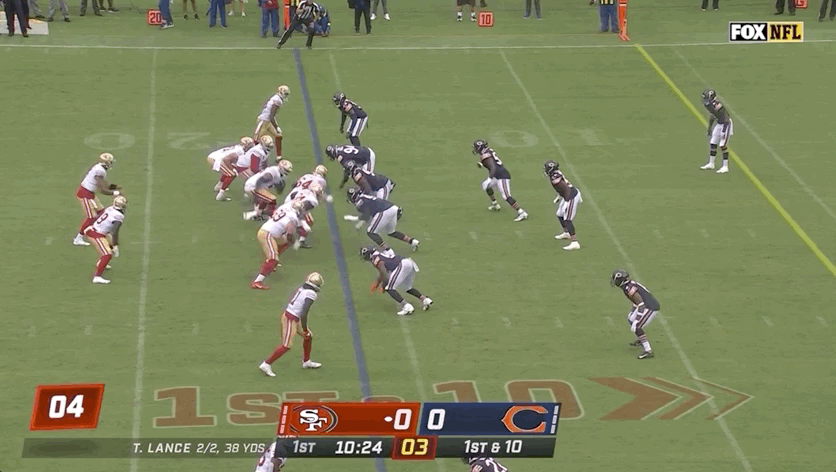
Analysis: This one was rather simple as the Bears took the ball away on the very first play inside the 20. It doesn’t get much better than that.
Trip 2 (Score: 0-0)
Quarter: 2 | Time Remaining: 12:19
How They Got There: Having to defend a short field on a drive that started in their territory, the Bears’ defense found itself in the red zone after Elijah Mitchell’s 11-yard run.
The Result: The Bears surrendered the first touchdown of the game after Samuel ran it in from six yards out.
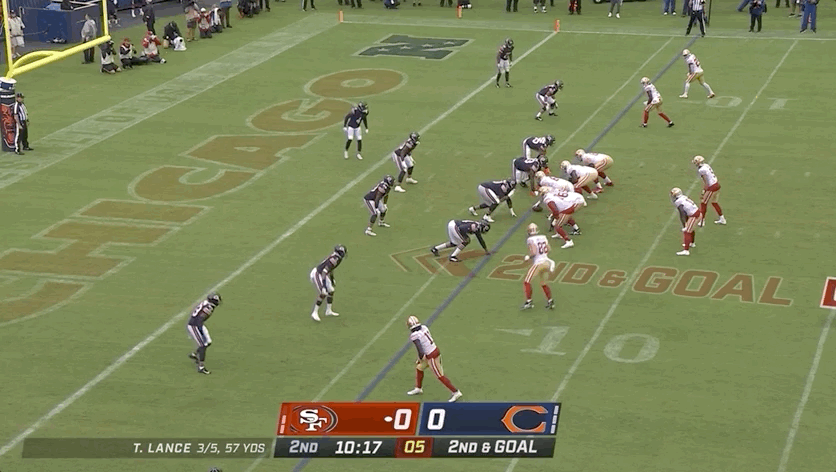
Analysis: Chicago did an excellent job on the first set of downs inside the 20 and the Bears found themselves with a chance to force the 49ers to settle for a field goal, but on third-and-3 from the 8 yard line, Justin Jones jumped offsides. This gave the 49ers a fresh set of downs and a first-and-goal from the four.
The Bears made a good play on first down, gobbling up Samuel in the backfield for a loss of two. Kudos to SAM linebacker Matthew Adams for not allowing the 49ers to set the edge and force the run back inside.
However, San Francisco punched it in on the very next play. Samuel outran multiple defenders including Al-Quadin Muhammad and Nicholas Morrow before running over Eddie Jackson.
That Justin Jones penalty proved to be costly.
Trip 3 (Score: 0-7)
Quarter: 3 | Time Remaining: 12:49
How They Got There: Chicago surrendered a 44-yard completion on a third-and-6 when Juan Jennings got behind Kyler Gordon for an easy pitch and catch down to the Bears’ 16 yard line.
The Result: The 49ers had to settle for a field goal.
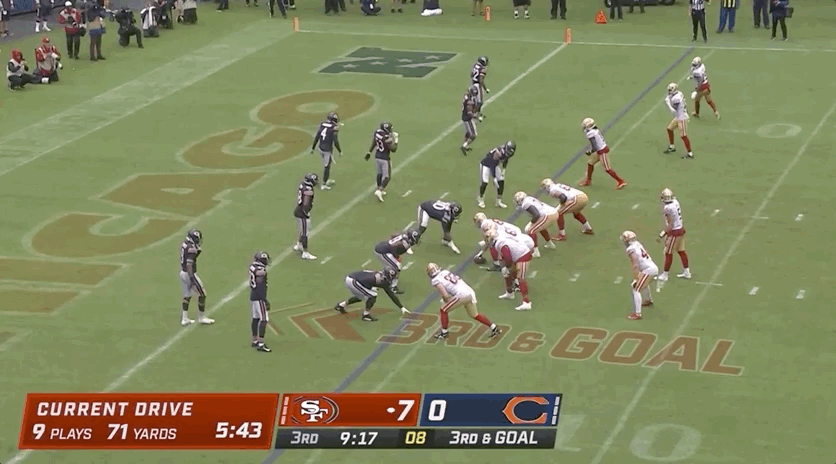
Analysis: The 49ers failed to find pay dirt despite running six plays inside the 20. They started off this trip by running it five-straight times before facing third-and-goal from the four.
This is where we get Trey Lance’s first (and only) pass attempt inside the red zone. That’s right, despite the 49ers running 12 plays inside the 20, they only attempted to throw it once.
But the Bears wouldn’t even let them get the pass off as Dominique Robinson and Roquan Smith collapsed the pocket and took Lance down for a sack.
Defensive Summary: 3 Red Zone Trips, 1 Touchdown Surrendered (33% conversion)
Get Chicago's Best Sports Content In Your Inbox!Become a smarter Chicago sports fan with the latest game recaps, analysis and exclusive content from CHGO’s writers and podcasters!
Just drop your email below!
Comments
Share your thoughts
Join the conversation


